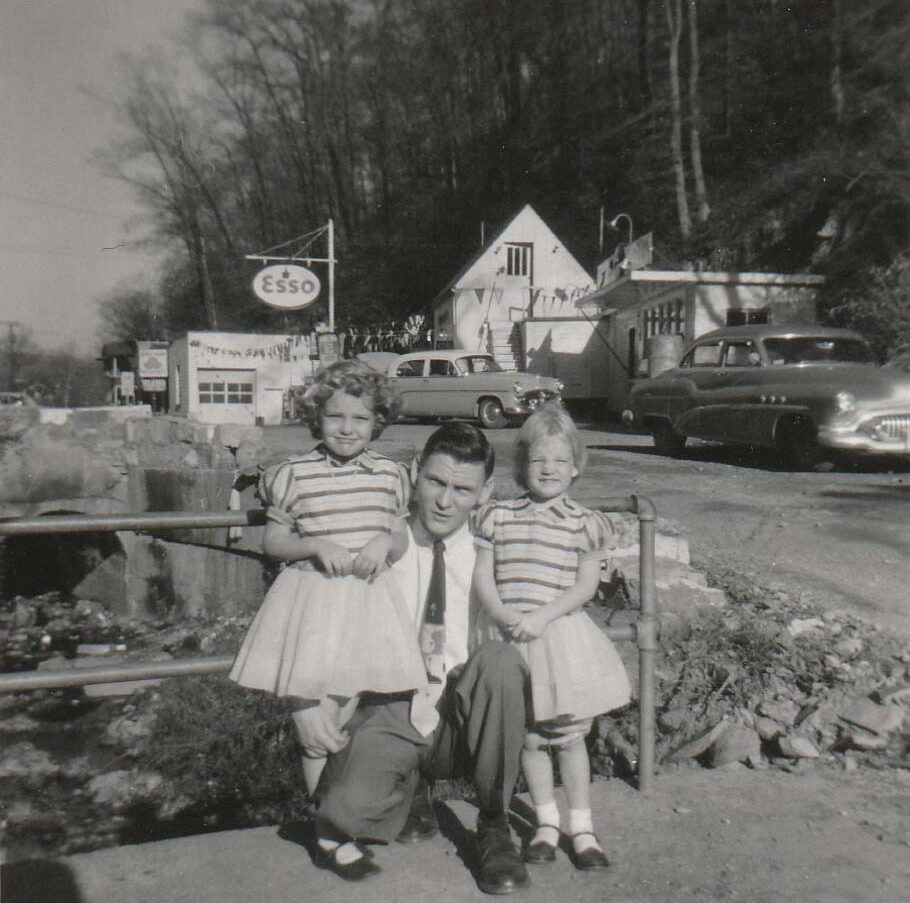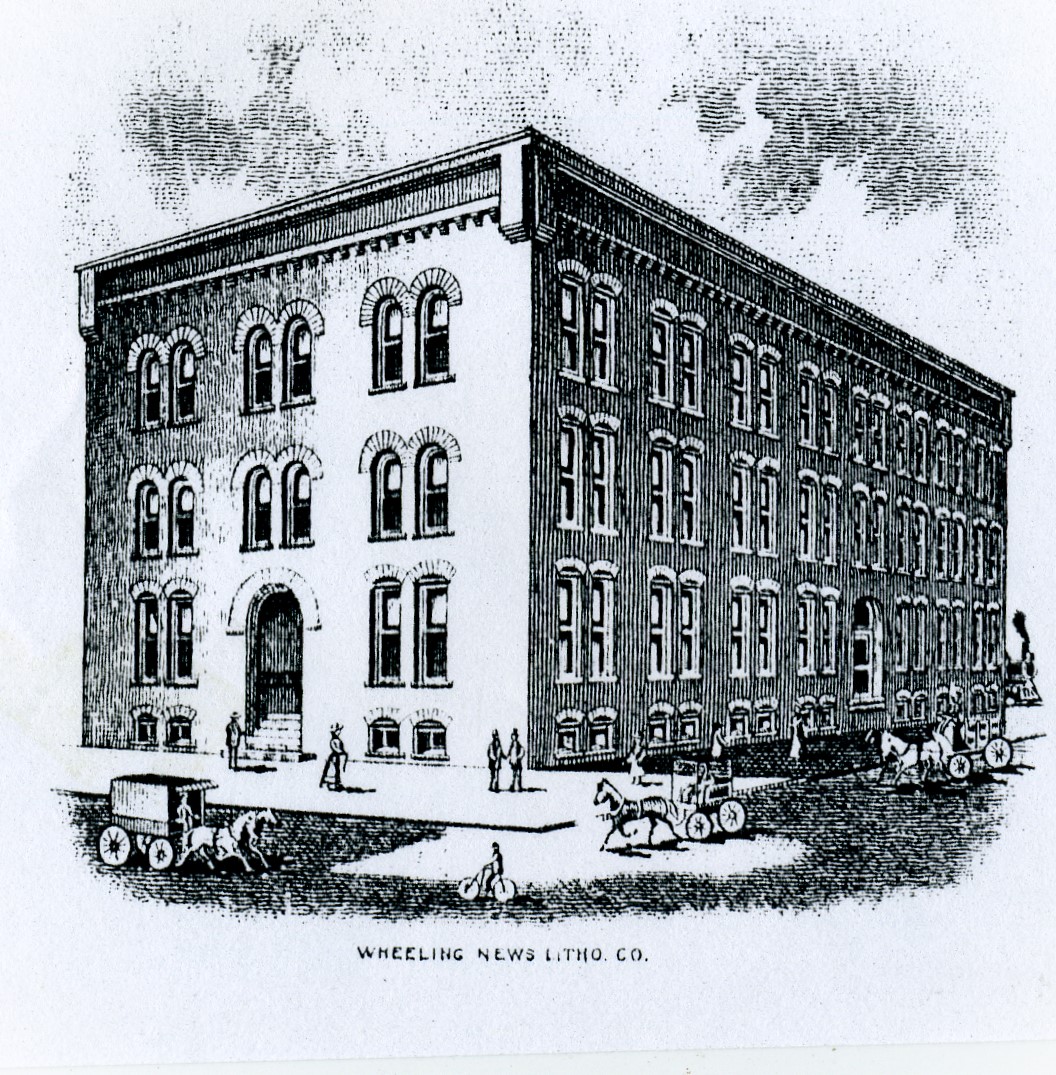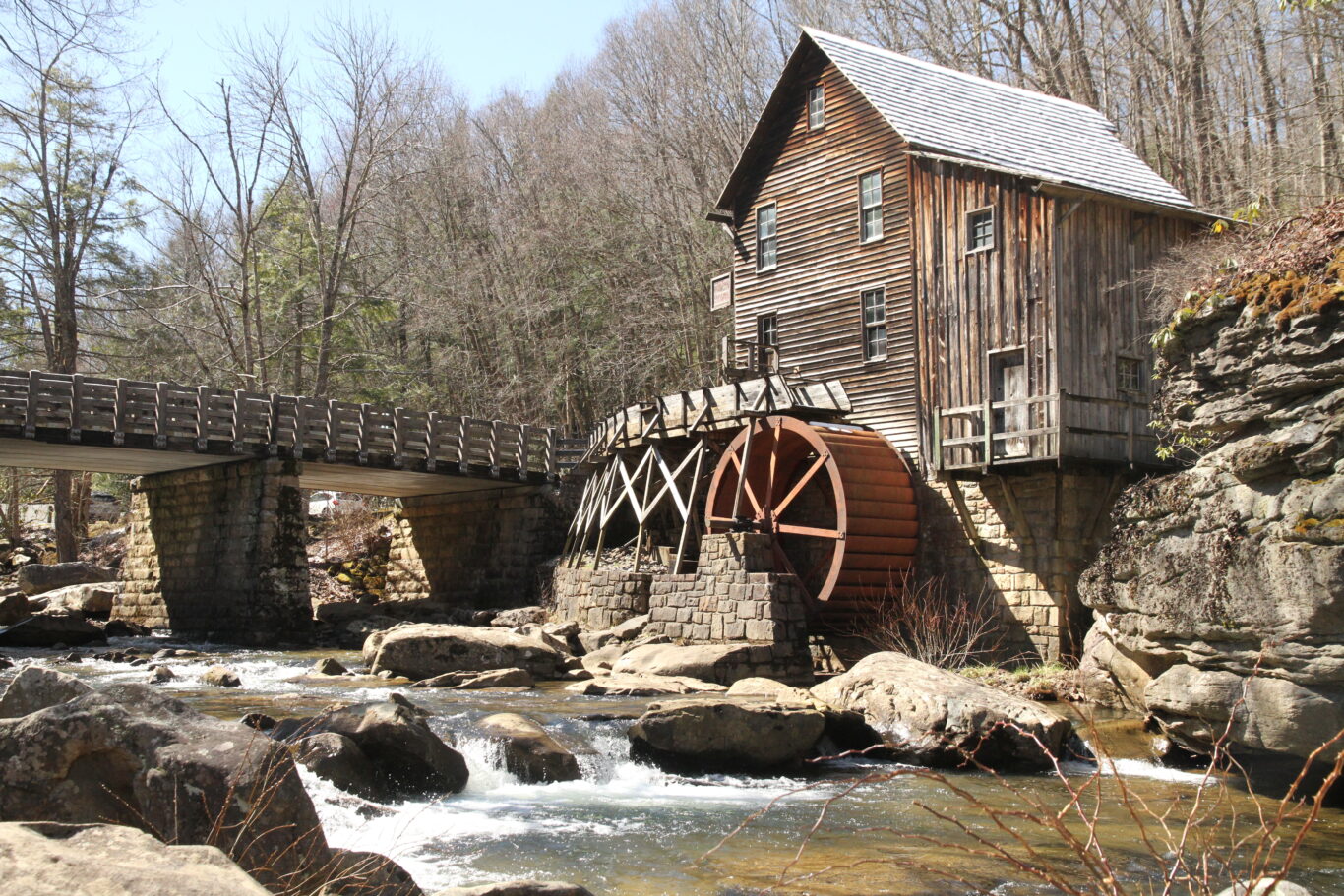By Joe McHugh
What makes a good neighbor? Lynn Springston liked to refer to himself as a “wood’s colt,” an old-time Appalachian expression for someone born out of wedlock. Sadly, his father who was a doctor was killed while serving in the English army during WWI around the time Lynn was born. I too had no father, my father having died of polio in 1951 when I was one and my mother, a teacher, never remarrying.
I met Lynn in 1970 when I was a young man of twenty running away from the conflicts and confusion of modern America. I’d spent most of my growing up years in Paterson, New Jersey, a once prosperous industrial city founded by Alexander Hamilton that was located astride the great falls of the Passaic River, fifteen miles west of New York City. By the time I reached my adolescence, however, that prosperity had dwindled to little more than a memory: almost all the factory buildings had been abandoned, their crumbling windowless red brick hulks like the ruins of some earlier kingdom of Middle Earth ringing a downtown struggling to keep its businesses open.
By the time 1968 rolled around, the future looked rather bleak for my hometown. So, I opted to leave college halfway through my freshman year and take to the open road having always been something of a wanderer.
It was while living on the coast of Oregon several years later that the idea of going “back to the land” captured my imagination. That was the terminology young people like myself used back then. “Back to the land.” Now, the fact that the great majority of us had never been on the land in the first place, the “going back” part was, to be honest, nonsensical and that was pretty much how our parents and more sensible siblings viewed us.
But I do sometimes wonder if this sudden desire on my part, this almost melancholy longing, was an expression of my Irish DNA, the genes passed down to me by generations of ancestors who tended the land and knew no other life. In my Irish-American family, I was the throwback. My brother and all my cousins set their sights on the future and the conveniences, safety, stimulation, and comfort that future had to offer. My eyes, by comparison, were trained on the rear view mirror, upon what had come before because, for me, the modern world was far too complex and rife with paradox. The simple life is what I was after, a life that would provide me with peace of mind and a genuine sense of community.

“I was both stunned and deeply moved. I had no idea Lynn did that for me. He never breathed a word. And it dawned on me that had he not vouched for me, my experience living there might have been quite different. I might have been just a no-account hippie who was out to ruin the country.”
Joe McHugh as a young man in 1969, about the time he set out to “wander.”
Of course I was to learn that rural living has its own set of complexities, but I was young and had yet to separate the flimsier threads of naïveté from the enduring ones of innocence.
So I began my search for land and found that land in Oregon was far beyond my reach given my limited savings and meager income from making leather goods. I realized I would have to go East, to the interior of Maine, the north country of Vermont, or the Finger Lakes region of New York State because that was where I heard I could find more affordable land.
When all was said and done, I wound up purchasing an 80-acre working farm among the hills of central West Virginia. The Gilmer County farm had a single-story house, three barns—one in the process of falling down—a chicken coop, a smoke house, a spring house, two large meadows, a garden, a large potato patch, and a small aging apple orchard. The purchase price for the lot was $6,000, which I managed thanks to $65-a-month mortgage from the Kanawha Union Bank in the nearby town of Glenville and a loan from my mother. She may have been deeply perplexed by the actions of her youngest child but she would still give him her blessing and whatever help she could.
So now I was a farmer living at the “head of holler” with a dozen or so neighbors working their farms down along Wolf Pen Run. They were many years older than me, some of the men even used horses to plow their gardens, cut and haul hay, and drag timber out of the woods. It was a very different world from the one I knew in northern New Jersey.
I was also a budding folk musician. I owned an acoustic guitar made in Japan and I could strum the chords to several dozen songs, the kind of folk songs made popular by Peter, Paul, and Mary, the Canadian duo Ian and Sylvia, Arlo Guthrie, and Bob Dylan. One day soon after my girlfriend and I moved onto the farm I went to check out the nearest town. Perched along the banks of the Little Kanawha River, Glenville serves as the county seat of Gilmer County and home to Glenville State College. It was while exploring the campus of the college that I visited the library.
“Do you have any books or recordings of folk music from the Appalachian Mountains?” I asked the librarian.
“We have a large collection,” she told me. “I’ll show you.”
As we made our way to the .780 section, she asked if I was new to the area.
“I just bought a farm near Cox’s Mill,” I told her.
This got her attention. “I grew up in Troy. That’s close to Cox’s Mill. Where exactly do you live?”
“At the head of Wolf Pen Run.”
When we reached the folk music section, the librarian scanned the titles before pulling out a thin paperback book with a photograph of an elderly man sitting on a chair with a guitar across his knees on the cover. The book was titled, Folk Songs of Central West Virginia and the author was Michael Bush.
She pointed at the photograph. “That man is Lynn Springston and he lives on Wolf Pen Run. He’s a very nice person and he contributed some of the songs in this collection. Have you met him yet?”
I shook my head.
“Well you should go and introduce yourself. I’m sure you’ll have lots to talk about.” “Can I check out the book?” I asked.
“Sure. Come to the counter and we’ll get you a card.”
As I drove home an idea caught my fancy. It was possible to learn a folk song not from the recording of some college student with a sweet voice and a partner to sing harmony or from a book but from someone who’d grown up in the tradition. It was, for me, a revelation.
So the next Sunday I went down the holler to Mr. Springston’s house and knocked on the door. In a moment I was sitting at his kitchen table enjoying a cup of coffee. “Now where did you say you grew up?” he asked. I’d already learned that Lynn was a bachelor and he clearly enjoyed having company, even if I was a bit strange for that part of the country.
“I was born in Pittsburgh but I grew up mostly in Paterson, New Jersey,” I told him.
“I went up to Pittsburgh once to see a doctor,” Lynn said. “He was a specialist. You see, I have the vertigo. I’ve had it most of my life. It makes me unsteady on my feet, like a duck dodging thunder.”
I tried to call up the image: a duck dodging thunder. It made me laugh.
“Did the doctor help you?” I asked.
“Not really. He said I had something wrong with my ears. That’s why the Army wouldn’t take me, which was okay with me. Being a Christian and being trained to kill people don’t go along in my book. Maybe that’s why God gave me the vertigo.” He smiled.
I asked him if he still played the guitar.
“I wish I could but the arthritis got me, and my fingers don’t work like they used to.”
We talked some more and I showed him the copy of the book I’d checked out from the library. He went back into his bedroom and came back to present me with my own copy, which I had him sign. I promised to come back again and we parted company.

The months passed and I became acquainted with more of my neighbors, not just those living on the banks of Wolf Pen Run, but through much of that part of the county. Despite being an outsider, having long hair and a beard, and wearing sandals during the summer months, everyone was friendly and helpful. They offered me advice on all kinds of things: when to plant my potatoes, how to sow beans in among the corn, how to make dandelion wine. Some neighbors would let me borrow their tools and they’d tell me which farm auctions to attend because the farmer who had passed away was known to take good care of his equipment. I really felt welcomed into the community.
Then one afternoon, maybe a year after my first visit with Lynn, I was hanging in Butcher’s General Store in Cox’s Mill, not far from where I lived. I was sitting and talking with four of the more senior idlers when a Volkswagen van pulled up outside in front of the gas pumps and two hippies got out. One was a tall and slender young man who had his hair tied back in a long ponytail while the other was a young woman with flowing yellow hair who wore a peasant blouse and long Indian-print skirt.
When they came into the store, all conversation stopped. The young man said they needed gas and Bud, the owner, went outside to pump it. In the meantime, they pulled a loaf of bread from a shelf in the store and removed a package of Colby cheese from the cooler. The woman found a jar of mayonnaise and when Bud came back in they paid him for the gas and groceries and left.
During all of this no one spoke a word. But then as the VW roared back to life and pulled away, Roy Ellison shook his head in disgust.
“Dang hippies. They’re ruining this country.”
Emmett Johnson agreed. “Why doesn’t he cut his hair and take a bath.”
Even Bud chipped in his two cents. “You should have looked inside that van. They’ve got bells hanging from the rear view mirror and it smells like perfume.”
I was flabbergasted. I couldn’t understand what was going on. “But I’m a hippie,” I blurted out.
All heads turned in my direction. “But you’re different,” Roy said, matter-of-factly. “You’re Joe.” And he meant it and given the look on the other faces, they did too. We were friends.
Still, I was confused. “I know I’m Joe, but I’m really not very different from those two people. So why am I okay and they’re not?”
“Don’t you know what Lynn Springston did for you?” Bud asked.Now I was seriously at sea. What did Lynn have to do with two hippies driving through Gilmer County on their way to God-knows-where? “After that first time you went and visited him,” Bud continued, “he went to nearly every farm around here to tell us that you were good people and could be trusted. That’s why it’s been so easy for you to get along with everybody.”
I was both stunned and deeply moved. I had no idea Lynn did that for me. He never breathed a word. And it dawned on me that had he not vouched for me, my experience living there might have been quite different. I might have been just a no-account hippie who was out to ruin the country.
I went on to spend a lot of time with Lynn during my years in West Virginia. I can remember once we spent months planning out how to find some lost jewelry of his mother’s—according to a family tale she had tossed it down a well that was then filled in on his family’s property—we even went as far as considering hiring a water witcher to search the area for the lost jewels, before deciding against pursuing the legend. Looking back on those couple of weeks so many years later, I realize the madcap affair was a source of pleasure for a lonely older man and his young hippie neighbor, a reason to hang out together and go chasing after moonbeams. Maybe that’s its own kind of treasure. And, of course, the jewelry is still there, waiting to be found.
I would like to conclude this recollection about my neighbor with a passage from a book I wrote titled, Coins in the Ashes, A Family Story of Grief, Gratitude, and Grace that chronicled my twelve-year search for an African-American woman named Helen Spriggs who cared for me when I was a young child. It has to do with my friend Lynn Springston.
“When I was living on the farm in West Virginia an elderly neighbor named Lynn Springston asked me to help dig a grave at the cemetery next to his church. Three of us dug the grave together, two men in their mid-seventies and me, a twenty-four-year-old rebel trying to fit in. I had youthful vitality; they had wisdom. The church was an old-fashioned white clapboard affair set atop a knoll overlooking Leading Creek, a lazy out-of-the-way watercourse that served as the local swimming hole. It was late summer and as we toiled, time seemed to stretch out in both directions, drawing together the generations of families who tended, and would tend, the farms roundabout. I don’t remember the name of the deceased, it wasn’t anyone I knew well, nor do I think the elders were in great need of my brawn—I am certain there were other local men just as willing to lend a hand—but grave digging was a ritual of long standing and I suspect it was Lynn’s way of weaving me more tightly into the fabric of the community. Looking back at the youth I was then, I readily admit I needed that kind of weaving.
“For most of the afternoon we took turns digging and exchanging rumors and jokes, and I can still recall the serene blueness of the sky overhead, the pungent scent of the earth, the scrape of the shovel as it struck rock here and there, and the pleasant ripple of Leading Creek as it flowed under the branches of the ancient sycamore from which the stout swinging rope dangled, a board tied to the end for the swimmers’ feet.
“There is a strong tendency to romanticize rural life, and I am as guilty of this as anyone. But forty years later, I continue to cherish those few hours I spent digging a grave with Lynn and his friend. Opening up our Mother Earth so she could receive back into herself one of her own.”
So that was my relationship with Lynn Springston when I was a fatherless young man just beginning to make his way in the world. Sadly, I failed to stay in touch with Lynn after I left Gilmer County although I did stop by his farm to say hello whenever I attended the West Virginia State Folk Festival in Glenville.
Well, Lynn died some years ago while I was living in California and I sometimes entertain the fantasy that when my own time comes and I arrive at the Pearly Gates, St. Peter will bid me to come inside. He won’t need to check the Book of Life to see what kind of person I was here on Earth.
“Lynn’s already vouched for you,” he’ll tell me, “and that’s good enough for me. Stay as long as you want.”

JOE McHUGH
McHugh, Joe. “A Good Neighbor.” Goldenseal West Virginia Traditional Life. https://goldenseal.wvculture.org/a-good-neighbor/




